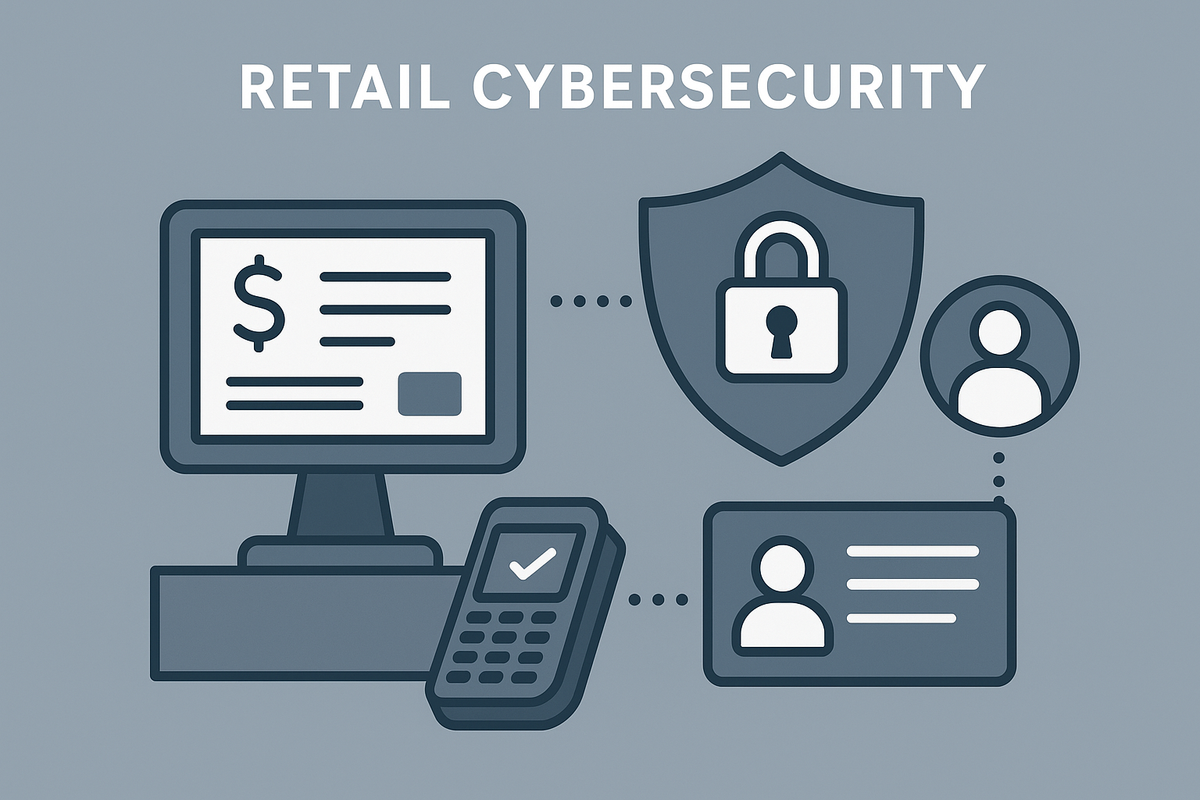Retail Cybersecurity: POS System and Customer Data Protection

Introduction
Retailers rely on POS systems to process sales, manage inventory, and handle customer data—making these systems attractive targets for cybercriminals. As retail transactions shift toward digital and omnichannel formats, new risks emerge requiring proactive data protection and regulatory compliance to sustain operations and customer trust.
POS System Security Threats
- Data breaches from malware or skimming
- Unauthorized access to payment terminals and enterprise networks
- Ransomware attacks targeting retail operations
- Insider abuse, including staff mismanagement of system credentials
Key Security Measures for POS Protection
- End-to-End Encryption: All transaction data must be encrypted from the point of entry to its final processing destination, mitigating data theft risks from interception or network sniffing.
- Regular Software Updates: Consistently update POS hardware and software to patch vulnerabilities and defend against new threats.
- Secure Networks: Connect POS systems only to protected private networks. Use VPNs and firewalls to segregate POS from wider business infrastructure.
- Strong Authentication: Implement strong password policies, enforce two-factor authentication, and limit user permissions based on roles to minimize internal risks.
- Antivirus and Anti-Malware: Deploy updated antivirus software for real-time scanning and defense against POS-targeted malware or ransomware.
- PCI DSS Compliance: Follow Payment Card Industry Data Security Standard requirements for payment processing, storage, and transmission security, protecting sensitive cardholder data and avoiding penalties.
Customer Data Protection
- Tokenization: Replace stored customer card data with unique tokens that are useless if breached.
- Incident Response Planning: Prepare and practice incident response drills, so staff can act quickly to contain and report breaches, minimizing impact.
- Employee Training: Teach retail staff security best practices to detect social engineering, phishing, and secure POS device usage.
- Physical Security: Keep video surveillance near POS terminals to prevent tampering and provide evidence if needed.
Advanced Practices and Testing
- Security Testing: Conduct regular penetration testing and vulnerability assessments to anticipate attacker strategies and reinforce defenses.
- Real-Time Monitoring: Use advanced detection systems to monitor transactions and respond to anomalies quickly.
Conclusion
Securing POS systems and customer data is not a one-time project—it requires ongoing vigilance, technological upgrades, thorough staff training, and compliance with industry standards. By embracing encryption, secure networking, compliance, and real-time monitoring, retailers protect revenue, reputation, and every customer transaction from cyber threats.Retail cybersecurity demands vigilant protection of both POS (Point of Sale) systems and customer data, using advanced encryption, strong authentication, and ongoing staff training. Robust strategies minimize breaches and maintain trust in retail operations.
POS Security Fundamentals
Retail POS systems are prime targets due to their role in handling sensitive payment and personal data. Security failures can result in financial loss, regulatory penalties, and damage to customer trust.
Core Practices
- Data Encryption: All payment and customer data should be encrypted end-to-end—protecting it in transit and at rest.
- Regular Software Updates: Update POS software frequently to patch vulnerabilities and defend against new threats.
- Secure Network Connections: Connect POS terminals only to trusted networks; firewalls and VPNs further limit exposure.
- Strong Authentication: Use strong, regularly updated passwords, role-based access, and two-factor authentication for both staff and admins.
- PCI DSS Compliance: Adhere to payment industry standards for secure card data processing and storage.
Customer Data Protection
- Tokenization: Replace sensitive card details with tokens to prevent exposure.
- Employee Training: Educate every retail staff member about phishing, social engineering, and secure POS practices.
- Monitoring and Incident Response: Implement real-time monitoring systems and rehearse incident response plans to limit breach damage.
- Physical Security: Install surveillance near POS terminals to deter tampering and provide evidence in case of breach.
Conclusion
POS and customer data security should be ingrained in every retail workflow. Encrypted transactions, strong access controls, compliance, and security-first staff culture are essential to keep retail operations resilient and customer data protected.
Take the Next Step with CodeSecure Solutions
Cyber threats are growing more sophisticated every day. With a trusted partner by your side, you can safeguard your business while focusing on what truly matters—growth and innovation.
At CodeSecure Solutions, we deliver comprehensive cybersecurity services in Chennai, uniquely tailored for startups, SMEs, and enterprises:
- Vulnerability Assessment & Penetration Testing (VAPT)
- Network Security Solutions
- Compliance Support (ISO 27001, PCI-DSS, HIPAA, DPDP Act, GDPR)
- Cloud & Endpoint Protection
- Security Awareness Training
No matter your industry or size, CodeSecure customizes solutions to fit your needs—ensuring your data, reputation, and operations remain secure.
Ready to Strengthen Your Defenses?
- 📞 Call: +91 73584 63582
- ✉️ Email: [email protected]
- 🌐 Visit: www.codesecure.in
Stay secure. Stay informed. Choose CodeSecure Solutions—your partner in cyber resilience.
